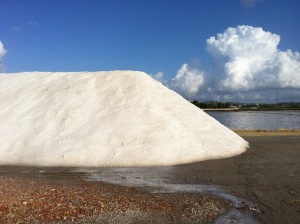 Why does every food writer and recipe I read in the US call for kosher salt? It’s so prevalent I find myself wondering who is behind the big push for Americans to be better cooks by using kosher salt? I was reading the recent NYTimes article “The Single Most Important Ingredient” by Samin Nosrat who wrote “Salt, Fat, Acid, Heat”, and was super excited to see what she said about salt! Because it truly IS the single most important ingredient you can use. And there it was – she advocated kosher salt. I was crushed.
Why does every food writer and recipe I read in the US call for kosher salt? It’s so prevalent I find myself wondering who is behind the big push for Americans to be better cooks by using kosher salt? I was reading the recent NYTimes article “The Single Most Important Ingredient” by Samin Nosrat who wrote “Salt, Fat, Acid, Heat”, and was super excited to see what she said about salt! Because it truly IS the single most important ingredient you can use. And there it was – she advocated kosher salt. I was crushed.
Allow me to clarify a few things: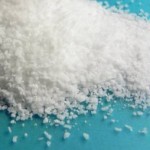
Kosher salt, used exclusively in the US, does not equal whole sea salt. Sea salt is made up of sodium choride (about 85%), as well as dozens of naturally-occurring minerals that help to temper and balance the sodium, both on the palate and in the body. Kosher salt goes through a process that strips all these minerals, leaving 99% sodium to which a chemical is added as an anti-caking agent. It’s called “kosher” because when koshering meat you needed to use a large kernel of salt, not the fine stuff that would melt. So, kosher salt has large kernels, what they call “grosso” in Italian or “gros” in French. 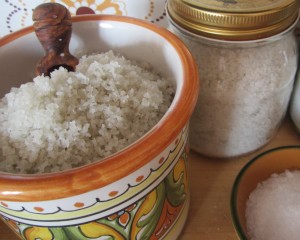
I lived in Italy for 13 years, long enough for my palate to change. After a few years, when I would return to the US for a visit, I was struck by how the addition of kosher salt adds acrid and bitter notes to any dish. The Culinary Institute of America did a study that reflected this surprising development in their quest for taste differences in various whole sea salts; I’m on the hunt for that study and will post it as soon as I can get my hands on it.
This denatured salt is then chemically laced to reduce clumping. It renders a product far inferior to natural, whole sea salt. I call it a “dead salt”. Kosher salt certainly should not be used in trying to reproduce authentic world cuisine, such as the Saveur magazine article on arab influences on the Italian island of Sicily. Here is a recipe from the city of Trapani on the west coast of Sicily, where they’ve been farming salt since the ancient Phoenicians 5000 years ago, and yet the Saveur recipe calls for kosher salt! Why? Salt from Trapani is a main export from Sicily and it’s available in the US – in grocery stores (Alessi brand), at TJMAXX, Home Goods and Italian specialty shops near you!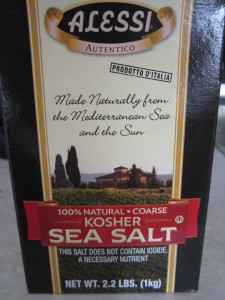
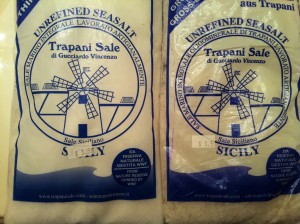
There is farmed whole sea salt available in the US from around the world: France, Spain, Brazil. But even salt mined from a mountain, such as beautiful Himalayan pink salt from the mountains of Pakistan, was once a sea 10-100 million years ago.
Well I for one have had enough and am on a crusade to fight kosher salt and help whole sea salt find its place in America’s kitchen. Join me! Buon Appetito!
I love this article Gina. In my recipes I regularly call for “kosher or fine sea salt”, leaving room for my readers to improvise!
Hi Gina–I hope all is well! I came across this today while trying to find a link to my Basque story. If you actually read the story, you would have noted that the the recipes are by Alex Raij and Eder Montero (not me); in fact the story is about Alex and Eder’s book about Basque cuisine. As cookbook authors, they want their audience to be able to easily access ingredients. They maintain that Basque sea salt is not as accessible kosher salt in the US. Best, Kathleen
Hi Kathleen! My point is that Basque sea salt is like any other sea salt farmed and used in Europe: a whole natural product. Kosher salt is a highly processed industrial product that is 99% sodium, unlike whole sea salt which is only about 85% and less harsh and acrid. Saveur has yet to publish a recipe that calls for anything but kosher salt. If it indeed was Alex and Eder’s intent to suggest a widely available salt that is closer to the Basque sea salt, they could have just said “whole sea salt”. But I’d bet that they just don’t understand that there is a vast difference between all whole sea salts and American kosher salt.